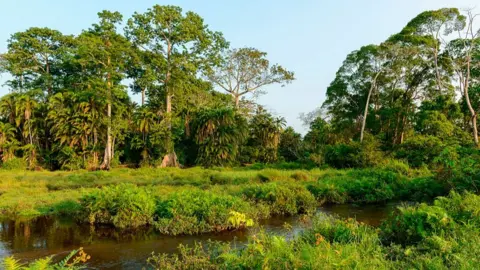**Charity Linked to Prince Harry Acknowledges Human Rights Abuses in Congo Park**
In a recent revelation that has drawn attention globally, a prominent conservation charity associated with Prince Harry has acknowledged that human rights abuses were perpetrated by its rangers at a national park in Congo-Brazzaville. This admission came in the wake of an independent review triggered by allegations made by members of the local Baka community against the rangers of African Parks, the organization tasked with managing the Odzala-Kokoua National Park.
The allegations against the rangers of African Parks are severe, with community members asserting that violent methods were employed to prevent them from accessing their ancestral lands, which are now designated as a conservation area. Reports from the British newspaper *Mail on Sunday* revealed claims of beatings, waterboarding, and even rape, aimed at silencing the Baka community’s resistance to restriction on their land use.
Despite the seriousness of these accusations, African Parks has been criticized for failing to disclose the specific findings of the independent review, which was conducted by Omnia Strategy LLP, a law firm based in London. While the organization has confirmed that abuse did occur in Odzala-Kokoua National Park, they have refrained from releasing detailed insights regarding the incidents or the conclusions drawn from the investigation. Instead, they have merely provided a general confirmation of the existence of human rights violations, raising questions about accountability and transparency.
The indecisive handling of this issue is concerning, especially as the findings from the independent review were reportedly submitted directly to African Parks. Representatives from Omnia Strategy have stated that their investigation into the alleged misconduct within Odzala-Kokoua has been ongoing since December 2023, yet specific results and recommendations remain undisclosed.
The BBC has sought comments from both Omnia and legal counsel involved in the investigation; however, no further information has been provided beyond their standard statements. In contrast, Prince Harry, who has served on the board of African Parks since 2016, has yet to respond publicly to these developments. He transitioned from being the president of the organization to a member of the Board of Directors in 2023.
In its defense, African Parks has outlined various measures it has implemented over the past five years to enhance the safety and rights of the Baka communities. These include recruiting an anthropologist to support the community better and collaborating with local human rights NGOs. However, these measures have drawn skepticism, particularly from organizations like Survival International, which advocates for indigenous rights. They criticized African Parks for not making the review’s findings public and expressed concerns that previous enhancements had failed to prevent the reported abuses. Survival International further revealed that African Parks had been aware of the abuse allegations since 2013, casting doubt on the effectiveness of their response strategies.
Amidst these controversies, African Parks, headquartered in Johannesburg, stands as one of Africa’s largest conservation organizations managing multiple protected areas across the continent. Supported by high-profile donors, including the European Union and notable figures such as Rob Walton and Howard Buffett, the charity reported a significant influx of funding, surpassing $500,000 per year.
However, the ongoing human rights violations and the opaque handling of the situation have raised alarms about the organization’s commitment to ethical practices in conservation. This incident reiterates the complex realities that often underpin conservation efforts, especially concerning the rights and welfare of indigenous communities.
As societies globally grapple with the intersection of conservation, human rights, and ethical governance, the case of African Parks and the Baka community illustrates the pressing need for transparency and accountability in conservation initiatives. The global community, and especially entities like Survival International, will be watching closely as developments unfold and as African Parks takes steps toward rectifying its past actions while addressing ongoing concerns within affected communities.



